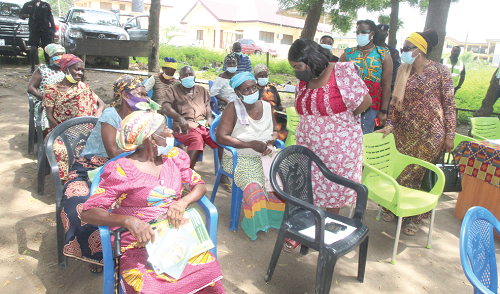
LEAP beneficiaries invest funds
A greater number of beneficiaries of the Livelihood Empowerment against Poverty (LEAP) programme are now investing their accumulated grants in economic activities in their communities to improve their livelihoods.
Currently, about 216,735 beneficiary households, constituting 63 per cent of the 344,024 extreme poor households benefitting from the programme nationwide, have invested their funds in profitable ventures.
The caretaker Minister of the Ministry of Gender, Children and Social Protection, Ms Cecilia Abena Dapaah, who made this known in Accra yesterday, said the investment of the funds was an encouragement to the government and its donor partners.
In total, about 1.5 million people are covered by LEAP.
Relief
Addressing journalists and a number of beneficiaries under the programme on a monitoring tour of the 73rd and 74th payment cycles in Accra yesterday, Ms Dapaah said the government was happy that the programme had brought some form of relief to beneficiaries.
He said government was committed to sustaining the Livelihood Empowerment against Poverty (LEAP) programme as a key social intervention measure.
“The two payment cycle taking place nationwide started on October 25th this year. Beneficiaries are taking double payment because the 73 payment cycle delayed. While we apologise for the delay, we hope that the double grant payment will go a long way to improving the lives of beneficiaries,” she said.
Also, according to the minister of sanitation and water resources, the monitoring exercise was also to help her familiarise herself with the LEAP grant disbursement process and any challenges that might need her attention.
She said securing the basic consumption for those households through the grants would also enable beneficiaries to engage in productive activities and invest in human capital of their children to help break the intergenerational cycle of poverty.
Impact
Highlighting the impact the LEAP programme was making, Ms Dapaah said the programme contributed to 12 per cent increase in school enrolment of children of school going age who were motivated to stay in school; improved access to healthcare services; improved food security and boost to agriculture.
She said ultimately, the programme was helping in the attainment of national development goals as well as some global development goals such as the United Nation’s Sustainable Development Goals.
“We appreciate the support of stakeholders towards the implementation of the LEAP programme such as UNICEF, the World Bank, and the Foreign Commonwealth and Development Office (FCDO) of the UK.
“We also appreciate media and a number of civil society organisations (CSOs) for the advocacy of the programme and the effort to promote social protection in the country,” she said.
Gratitude
Some of the beneficiaries, who spoke to the Daily Graphic at the payment centre at the Accra North Municipal Assembly, expressed gratitude to the government for the support.
However, they all said although the funds were helping, the increasing cost of living made the money inadequate and pleaded for a little rise in the funds.
Background
Currently, beneficiary households receive either GH¢64, GH¢76, GH¢88 or GH¢106 depending on the number of persons in a household defined as people who cook from one pot.
The funds are supposed to be delivered every two months.
LEAP was introduced by the government in 2008, for extremely poor and vulnerable households which have the following three categories of eligible members: Orphaned and vulnerable children (OVC) or, Persons with severe disability without any productive capacity and Elderly persons who are 65 years and above.
The main objective of the LEAP programme is to reduce poverty by increasing and smoothening consumption and promoting access to services and opportunities among the extremely poor and vulnerable.
Writer’s email:
